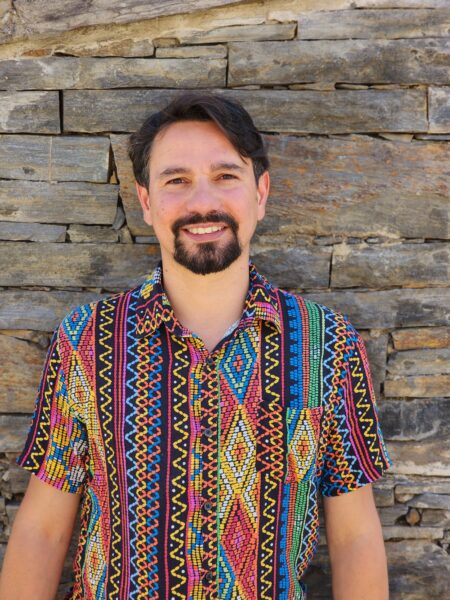
Departamento de Comunicação e Arte | Universidade de Aveiro
Campus Universitário de Santiago
3810-193 Aveiro
Portugal
Email: luamclarindo@gmail.com
Tel: (+351) 234 370 389 (ext. 23700)
Luam Clarindo
Luam Clarindo is a Brazilian musician, percussionist, researcher, and educator currently residing in Portugal. He studied percussion at the Conservatory of MPB in Curitiba with Vina Lacerda, Luis Rolim, and Toni Antoniacomi, learning techniques for drums, pandeiro, zabumba, cajón, and more. He holds a bachelor’s degree (2019) and a master’s degree (2023) in music from the Federal University of Paraná (UFPR), with a focus on sound production and creation. During his undergraduate studies, he wrote a monograph on modern techniques for the pandeiro and controlled improvisation routines. His master’s research focused on creative interactions between music and dance in free improvisation performances, both supervised by composer and professor Dr. Indioney Rodrigues. For his master’s research, Luam conducted interactive improvisation labs with UM – Núcleo de Pesquisa Artística em Dança, a contemporary dance group coordinated by Professor Dr. Rosemery Rocha, and with Improviso Dança e Música, an event organized by Summus Contato Improvisação in partnership with UM – Núcleo, supported by the Curitiba Cultural Foundation (Fundação Cultural de Curitiba).
Beginning in 2017, Luam worked as the musical curator and collaborative musician for Improviso Dança e Música, where he created a free improvisation music group called Projeto Netuno. He continues his research on the relationship between music and dance within the context of improvisation, now in Portugal, collaborating with MusicDance Portugal and dancers Nicolle Vieira and Sara Paternesi in spaces such as Centro em Movimento (c. e. m) in Lisbon. In 2024, Luam began a PhD in Artistic Creation at the University of Aveiro, where he is conducting research on improvisation with percussion instruments and electronics under the supervision of Dr. Nuno Aroso and Dr. Filipe Lopes. His research aims to experiment with digital signal processing and interactive systems to transform the cuíca into an augmented instrument. In June 2025, Luam gave a performance at the International Conference on Media, Arts and Interaction (Intermediartes) in which he demonstrated the partial results of his doctoral research. Luam is also a member of the Brazilian Society for Electroacoustic Music (SBME), the Musical Creation and Artistic Interaction Laboratory (LACSIA) research group at UFPR, and the Núcleo Música Nova at Paraná’s State University (UNESPAR).
Doctoral Project
Title
Hyperfriction-Drum: free improvisation with cuíca and electronics
Advisor
Nuno Aroso and Filipe Lopes (co-advisor)
Abstract
This project proposes the creation of original experimental musical performances for cuíca and electronics, aiming to expand the instrument’s physical and expressive affordances—particularly its friction-based organic tone and multidimensional timbre. Central to this process is the development of an innovative interactive music system, drawing on research in physical computing, embodied music cognition, musicology, digital musical instruments, and live electroacoustic practices. The cuíca, an Afro-Brazilian friction drum with a deep-rooted cultural history and singular sonic identity, has rarely been approached as a central performative element in real-time interactive music contexts. Although artists such as Paulo de Assis have engaged with real-time processing of the cuíca’s sound, its gestural and tactile playability remains largely unexplored in interactive and experimental setups. By focusing on the instrument’s embodied performance qualities—its responsiveness to friction, gesture, and pressure—this project seeks to destabilise traditional conceptions of the cuíca and open new performative trajectories. Through experimental performance practices, it aims not only to uncover novel sonic possibilities but also to question and reframe the instrument’s conventional playability and its role within contemporary music-making.
Keywords
Artistic research; Free improvisation; Percussion; Augmented Cuíca.
